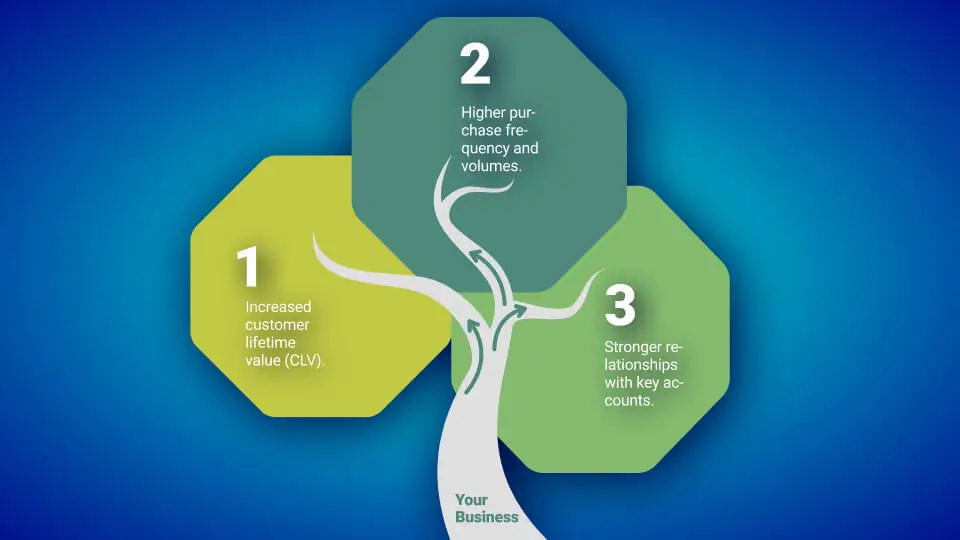Rewards programs hold the power to increase customer loyalty and retention, driving repeated business.
Whether you’re a wholesale distributor, retailer, or service-oriented business, the design of an effective reward program can set you apart.
In this guide, we’ll explore how you can create a rewards program tailored to your B2B business.
Understanding Rewards Programs and Their Purpose
In the B2B sector, rewards programs are structured strategies designed to motivate customer behavior, such as:
- Repeat purchases
- Referrals
- Larger orders
Unlike consumer-facing programs, B2B rewards often revolve around long-term relationship-building and customized incentives aligned with the unique dynamics of business partnerships.
The Challenge: Tight Margins and High Competition
Wholesale distribution is one of those industries in which margins are thin due to price competition. Rewards programs provide an edge for such industries by building long-term relationships with clients and encouraging repeat business, thus reducing reliance on one-time deals.
Role of Rewards Programs in Customer Loyalty
A well-implemented rewards program enhances relationships with customers through appreciation and value delivery.
Loyalty programs serve as differentiators in very competitive industries, like wholesale distribution, where margins are low and can keep customers repeatedly coming back.
How Rewards Programs Differ in Wholesale Distribution
In wholesale, rewards programs cater to high-volume purchasers and decision-makers. Unlike retail rewards, these programs offer practical benefits such as:
- Bulk discounts
- Exclusive access to inventory
- Co-marketing opportunities
Why Do Businesses Need Reward Programs?
Customer loyalty often brings up the rear in conversations of B2B industries, which are generally dominated by the topics of price and product availability.
However, loyalty programs are not a retail strategy anymore. They become a key component for every B2B business intending to get closer to their customers, win their trust, and finally drive repetitive business.
According to research from Harvard Business, a mere increase of 5% in customer retention can add as much as 25-95% to profits. A well-conceived rewards program will give you that edge to make sure your business is not just another supplier but a long-term partner.
What’s in it for your business?
- Increased customer lifetime value (CLV).
- Higher purchase frequency and volumes.
- Stronger relationships with key accounts.
Key Benefits of Implementing Rewards Programs
Reward programs come with a number of benefits; from boosting customer retention all the way to maintaining brand loyalty. It’s a crucial step that aids in scaling your business.
Boosting Customer Retention Through Incentives
Rewards programs retain loyalty by offering benefits that tie consumers both emotionally and financially to the business.
For example, a tiered system gives greater discounts for bigger spending, so switching becomes less attractive for customers when it comes to competition.
Driving Repeat Purchases With Tailored Rewards
Customized rewards -including exclusive product previews or personalized discounts- create an emotional attachment with customers. These gestures will drive repeat business and help in building brand loyalty.
Attracting New Customers Via Referral Programs
Referral programs leverage existing customers to bring in new business. Incentives for referrals, such as credits or shared discounts, create a win-win situation for both the referrer and the new customer.
Maintaining Brand Loyalty and Customer Engagement
Rewards programs can reinforce brand identity. Offering meaningful, memorable rewards builds a positive association with your brand and enhances customer engagement.
4 Types of Rewards Programs and Which Fits Your Business
Points-Based Rewards: Simple and Effective
A points-based system allows customers to collect points for every purchase, redeemable for discounts or gifts. This approach is straightforward and encourages consistent buying behavior.
Tiered Rewards: Encouraging Higher Spending
Tiered programs motivate customers to reach higher spending levels for increased benefits. For example, customers might receive greater discounts or exclusive offers as they advance through tiers.
Cash-Back Rewards: Instant Gratification for Customers
Cash-back rewards appeal to businesses looking for immediate, actual benefits. Offering a percentage of the purchase value as credit or cash fosters satisfaction and loyalty.
Exclusive Access and Special Offers: Building Prestige
Providing VIP customers with exclusive access to products, events, or early releases creates a sense of prestige. These rewards resonate particularly well in industries where relationships are key.
5 Best Practices for Designing a Successful Rewards Program
Setting Clear Objectives for Your Program
Define specific goals, such as increasing average order value or retaining customers for longer periods. Clear objectives guide program design and performance measurement.
Identifying and Understanding Your Target Audience
Analyze your customer base to understand their preferences, purchasing behavior, and challenges. Tailored rewards are far more effective than generic offerings.
Offering a Diverse Range of Rewards That Matter
Variety in rewards ensures you cater to diverse customer motivations. For example, some customers may value financial benefits, while others might prioritize recognition or exclusive access.
Creating an Easy and Transparent Redemption Process
A complicated redemption process can deter engagement. Ensure that customers can easily access and utilize rewards without hurdles.
Leveraging Customer Feedback to Refine Rewards
Regularly collect feedback to understand how well the program meets customer needs. Adjust rewards or processes based on insights to enhance satisfaction and effectiveness.
How to Measure the Success of Your Rewards Program
Track metrics such as:
- Redemption rates
- Customer retention rates
- Average order value
- Customer satisfaction scores
Adjusting Strategies Based on Performance Data
Use data insights to refine your program. For example, if redemption rates are low, consider simplifying the process or increasing reward variety.
Using Surveys to Understand Customer Opinions
Surveys help you learn what customers think about your program. Their feedback can highlight what needs improvement and ensure the program meets their expectations.
Rewards Programs Tailored for the MENA Region
The MENA market presents unique opportunities and challenges for wholesale distributors:
- Price sensitivity: Buyers prioritize value, making cost-saving rewards like cash-back or discounts highly attractive.
- Relationship-driven culture: Loyalty programs that emphasize trust and long-term partnerships resonate deeply.
- Cultural relevance: Offering rewards tied to regional holidays, such as Eid discounts or event-specific perks, builds stronger connections.
Conclusion
Building an effective rewards program isn’t all about offering perks; it is about knowing your customers, setting clear objectives, and leveraging technology to deliver an easy experience.
With best practices in place and your ear to the emerging trends, a rewards program can be built that drives loyalty, engagement, and differentiates your business.
Partner with HKS Global Group today and explore effective solutions to boost retention, drive repeat business, and build lasting partnerships! Start with us now!
FAQs
What is the most common type of rewards program?
The most popular type of reward is points-based because of its simplicity and effectiveness.
How can I measure the success of my rewards program?
Track KPIs: customer retention, redemption rate, and average order value as performance indicators.
Are rewards programs effective for small businesses?
Yes, customized rewards programs can help small businesses build loyal customer bases and, in fact, compete with larger enterprises.
Maria
I'm a Fintech & Digital Distribution Writer. I do create engaging content on B2B solutions, gift cards, eSIMs, and prepaid services and more. I provide tailor-made solutions that empower businesses and consumers.





